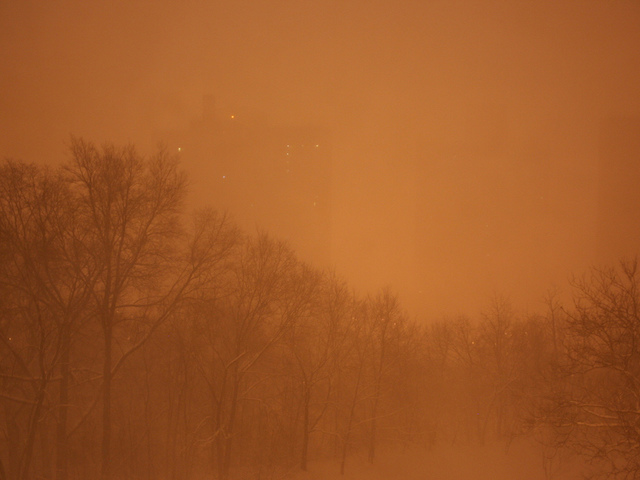‘He doubts he has the capacity to uproot himself and start over in a foreign land at this age. But times of war and revolution have a tendency to embolden the meek, to electrify the confident.’

April 8, 2016
Ziggy Chang waits alone for the bus on a cold Brooklyn night. A baleful wind lashes his face. His eyes begin to lose focus, the wintry void blurring into impressionistic splotches of color. He feels like the miserable lead in an existential play: one man, with neither past nor future, on a solo sojourn into nothingness.
A buzzing in his pocket startles him. He fishes out his phone. “Hello?”
“Thanks for telling me you were leaving.”
“Amanda,” he exhales. “It’s getting late. I didn’t want to take a cab.”
“Whatever, Zig,” she says, her voice reaching for airiness. “It’s no biggie. Get home safe. That’s all I wanted to say.” Ziggy hears laughter and thumping music in the background. For a moment, he wonders why she called in the first place. Did she expect an apology? An invitation? Or something else altogether?
No matter. “You too,” he mumbles.
There is silence on the other end. The background noise continues. “It was good to see you,” she says finally. “I really meant it when I said we should be friends. Okay?”
“Okay,” he agrees.
“I hope we can. Good night, Ziggy.”
“Good night.” Ziggy pockets his phone and squeezes his eyes shut with a sigh. He flexes his fingers, trying to regain sensation in his tingling extremities.
The night had started amiably enough in a noodle joint off Mott Street. Catching up with Amanda over bowls of soup and garlicky greens, he found it hard to believe that they hadn’t seen each other since the summer. They fell into easy, playful conversation as always. Her eyes sparkled with mischief as she recounted the latest gossip among her girlfriends or her atrocious study habits for the GRE. Somehow she managed to convince him to go to a house party with her. Only when they were on the train did he find out it was in Ditmas Park.
Now he is here, a prisoner of his own thoughts, not quite sober and not quite drunk, but definitely very, very cold. Goddamn it. He lights a Mild Seven and paces around in the glass demi-enclosure of the bus stop, twirling in circles, kicking at a mound of dirty snow. As he smokes, he imagines a fire sparking in his lungs and spreading through his whole body, filling all his veins and sinews with a burbling, cheerful heat. He exhales smoke and steam, his insides a cauldron, volcanic ash spewing from his molten fingertips and nostrils and ears and…
Ziggy opens his eyes to find himself sucking on the sad short nub of a cigarette. The wind howls angrily. Too cruel, this world. He flicks the butt into the snow. How he wishes he were home already so he could lay down and drift idly into a sea of dreams. Instead, he senses the polar chill settling deeper into his bones. He feels ice crystals spreading and sprouting on his skeleton, turning up a silver tundra across his being—
“Thank fucking God,” Ziggy says aloud as the bus rolls to a stop several feet away from him. He clambers over the snowbank and into the blast of warmth from inside. He’s been saved from his existential play. A ghostly Samuel Beckett shakes his fist from on high. You win this time, Chinaman.
When Ziggy was a boy, his grandmother once told him a story about a friend of hers – or was it a distant relative? a cousin or aunt? – who indulged so recklessly in unrequited love that she went mad. She became enamored of a neighbor, the debonair son of a scholarly clan. He treated her kindly, by all accounts, but kept his distance to avoid stoking the girl’s passion. Then he went off to Europe to study philosophy, it was said. This was Shanghai of yesteryear, a city brimming with tumult and desire. When the Japanese invaded, she refused to leave her home for fear of losing the only thing that physically bound them. That shikumen alley and its stone arch, those façades she’d known her entire life; she couldn’t bear to leave it, and his memory, behind. In the end, they had to drug her into submission and whisk her away to the countryside with the rest of the family. She never recovered.
Ziggy remembers this story on the bus ride home. He wonders what became of this lovestruck girl. Did she die from inconsolable ache for her modern gentleman? Did she writhe in agony, foam at the mouth, cry out his name while firebombs whirled through the air? Staring out the window, Ziggy sees shadows of somnambulists and brightly lit bodegas. This world seems much less real than the wartime Shanghai of his imagination. It is less urgently alive, he thinks. The era of his grandmother’s youth sounds so lurid and fantastical compared to his own existence. In his late twenties, Ziggy feels as though he has been bumbling for years already, eking out a living, painting paintings, cooking meals that are occasionally scrumptious but usually average, waking and working and walking and waiting – for appointments, for subways and buses, for holidays and vacations, for the right person to come along. All these things do not a life make, he sometimes worries.
The world he inhabits is a blur of shapes and colors, a ceaseless continuum of coffee and cigarettes and half-remembered stories. Hard to imagine what his grandmother had gone through by the time she was this age. She had had to flee, in rapid succession, invasion and revolution and economic misfortune and heartbreak and social stigma, years of perpetual crisis that sent her scurrying across the entire globe, from Shanghai to Hong Kong and then London and on to New York, all before she decided to settle down on the American West Coast at last. It was the height of the McCarthy era. At some point during this voyage, she took up Belinda as her English name. Back in those days she scoffed at anyone who dared label her a communist sympathizer. “I care for no government,” she would say. “The only thing that concerns me is my liberty.”
Quickly assimilating into the Chinese ecosystem of San Francisco, Belinda claimed she ended up owning a restaurant by accident. As a young girl, she had grown up in an aristocratic family with a retinue of maids and personal attendants. How strange it must have felt to suddenly spend her days at the service of others, fretting over their food, seeking the validation and support of customers. Ziggy remembers how noisy and gleeful the kitchen seemed to him as a child, all those buckets of garlic bulbs and peeled shrimp, the glistening flanks of meat, slender stalks of bok choy, flames licking the bottoms of enormous woks. His grandmother would give him ginger candies to nibble on while she strode about keeping a careful eye on her dominion. In middle school, he would spend his afternoons in the restaurant after getting off school. Mostly he tried to keep out of the way, whether that meant watching Taiwanese dramas with the off-duty cooks or doing homework in the tiny storage closet that his grandmother had converted into a makeshift office. Belinda suffered no fools. She especially did not tolerate any nonsense from her four sons or the rest of the grunting males who were involved in the daily tasks of running her business. She barked her orders in a pidgin of Cantonese, English, Mandarin, and Shanghainese. No matter how busy things got, she always managed to acknowledge Ziggy’s presence in the simplest of ways: a plate of freshly steamed pork and leek dumplings, a bowl of fried rice with egg and scallion. Food was like a shared secret between them, a language of its own that conveyed an earthy, uncomplicated love. There was no need for any grander gesture.
Now a full grown man, Ziggy often tries to recreate those modest, pleasing meals that Belinda delivered to his lap. He makes white rice with a medley of vegetables, both stir-fried and pickled. In winter, he tries his hand at egg drop soup with a few extra heapings of sliced scallions. When summer swelter sets in, he prepares cold sesame noodles with Sichuan peppercorns and scarfs down two bowls or more, eyes watering with joy, sweat sliding down his neck. He does not cook solely Chinese food, of course. Over the years, Ziggy has discovered that he makes a mean pesto sauce. He has a natural gift for chopping carrots and celery to the perfect size for Japanese-style curry. Then there’s ochazuke, easy to throw together in a pinch. That, he decides, is what he’ll eat once the bus whisks him home. He’ll sauté some shiitake mushrooms and whatever else is left in his fridge. Throw it all into a bowl, along with leftover rice, to soak in piping hot green tea. Top off with some strips of seaweed. Let the savory goodness restore him. He’ll go to bed with a warm belly and happy mind. Yes, this is what he looks forward to.
Amanda was usually full of praise for the meals he cooked, but she regarded ochazuke with great skepticism. “Green tea over rice?” She balked the first time he introduced the dish to her. “I don’t know, Zig. Seems kind of weird to me.” After hemming and hawing for a few dispirited mouthfuls, she let the half-eaten bowl grow cold on his kitchen table.
All things considered, Ziggy thinks, they managed to stay together for a respectable length of time. They had met only the previous spring – less than a year ago! – at an antique market in the city. That day they both happened to be browsing through boundless stacks of old photographs and magazines, gazing at ugly figurines and faded dishware. He noticed her earrings first, an understated jadeite set in circles of brass. She was examining a salt shaker shaped like Jesus, turning it over in her hand with bemusement. Her short hair was a reddish gold. He saw that her eyes were a lovely sea foam hue when she looked over at him. He didn’t look away.
Ziggy accepted her presence in his life as a happy fatalism. They fell gracefully into companionship just as the days in New York were growing warmer and longer. When Amanda got drunk, she would coo and squeal and brush her fingers lightly across his face, fawning over the blush of alcohol in his cheeks or his thick mane of hair. “But who are you?” she demanded on more than one occasion. “Where did you even come from?” She would lay on her side and prop her head up with one hand, staring dreamily and expectantly at him. Ziggy, for his part, always had a different answer for her. He would tell her he was born in San Francisco on the night of a full moon. He was named after his father’s favorite David Bowie album. His family had been in California for one and a half generations, but before that his grandmother had traveled thousands and thousands of miles to start from scratch several times over, and wasn’t it amazing how many things must have had to fall into place in order for her to invent herself anew as Belinda and become mother to four and then grandmother to seven, now an octogenarian matriarch cum restaurateur whose spirit, Ziggy often felt, was the only solid thing he’d ever known. The stars aligned for Belinda and granted her extraordinary vitality and dumb luck. It made him shudder to think how many things could have gone awry. He supposed he should take comfort knowing that the stars must be aligned for him, too, by extension. His existence could not have been mere accident, borne of millions of contingencies. But why was it so hard to find purpose? The years trudge on and on and his ennui has yet to dissipate or diminish.
Amanda seemed to navigate the world with a great deal more ease than he did. She knew the most efficient way to weave through a crowded art gallery to procure wine. She could make easy conversation with bartenders and taxi drivers and waiters. Her laughter was warm and bright, infusing a space with its golden insouciance. Ziggy felt that they complemented each other well. He thought of himself as a stoic man. Amanda always told him he was cool as a cucumber. But so often and so easily does he feel imperiled by his immediate surroundings, his heart an anxious bird in a cage of bone.
Belinda’s presence, more than anything else, has been a comfort to him over the years. Whenever he returns to the West Coast, Ziggy knows he can find his grandmother shouting at people in that raucous kitchen or hobnobbing with her associates in the banquet hall. Recently he has noticed that a cloudiness surfaces in Belinda’s eyes on occasion. Her movements are stiff and belabored in a way that he has never seen before. He catches her staring off into space sometimes, even in the midst of the usual bustle at the restaurant. Perhaps she is just lost in thought. Ziggy often finds himself in a daze at his young age. For someone like Belinda, then, it should be easy to lose oneself in thought.
Earth to Ziggy, Amanda would say whenever she noticed a glazed look on his face. Ground Control to Major Tom.
Ziggy is almost home by now. He begins to recognize the streets outside the bus window. The landscape emerges as if from a fog, each block filled with distinct memories. Here is the restaurant where he and Amanda once shared mussels and fries. They kissed beneath this tree at the edge of a park. This is the corner where he stood and smoked an entire pack of cigarettes the day she broke up with him, watching people as they passed before him in the early summer evening. Months and months have come and gone. Ziggy imagines it like a time lapse sequence in a film, the lush green of Brooklyn summer dimming to hues of burnt orange and then brown. Leaves shrivelling and plunking down to the ground, tree branches left barren and forlorn, coated in powdery white by one snowfall, and then another and then another until the snow melts into an icy clarity, and voilà! Here we are on a somber Saturday night in January.
As he climbs up the three flights of stairs to his apartment, Ziggy remembers the curious mixture of relief and desolation he felt when Amanda declared they should be friends. They had been eating gelato in Central Park that day. He had been planning to take her to see a movie and maybe go for a stroll that evening by the waterfront. But instead he went straight home to his apartment without air conditioning and lay in bed with his cat. For the first time that summer, he didn’t feel suffocated by the heat. There was a strange placidity to the afternoon air. Ziggy was surprisingly calm in a way that he hadn’t felt for months. And yet a gentle melancholia lapped around him like the ebb of a low tide. Something about his initial encounter with Amanda had seemed fated, he realized. The subsequent stretch of time spent in each other’s company, eating and sleeping, making love or bickering, was so mundane but reassuring. It was not quite love, perhaps. But in her company Ziggy experienced a robustness of spirit that he tapped very seldomly on his own. In her absence, he was tranquil again, undisturbed.
There is a timid mewl when Ziggy enters his apartment. His cat, Funny, simpers over to him and rubs up against his leg. “Hey, buddy,” Ziggy says quietly, leaning down to scratch his belly. “You need a snack, too, huh?”
Ziggy moves into the kitchen, rooting out a carrot and some mushrooms from the refrigerator. He fills his slightly rusty kettle with water and turns on a flame on the stovetop. Then he fishes through his pantry until he finds a packet of green tea.
After feeding Funny some treats, Ziggy eats a bowl of ochazuke and lets out a long sigh. The radiator creaks and clangs. A pleasing sibilance fills the room as heat churns from the basement boiler and spreads throughout the rickety old building. Ziggy puts away dishes into the sink, then strips down to his boxers. He scoops up Funny the cat and carries him into bed.
Ziggy Chang does not know if he could ever be as courageous as Belinda. He doubts he has the capacity to uproot himself and start over in a foreign land at this age. But times of war and revolution have a tendency to embolden the meek, to electrify the confident. He hopes he never has to find this out for himself. Even a small heartbreak, it seems, is enough to throw him off balance. But he can’t be faulted for that, now can he? Ziggy looks out at the canvases and sketchpads that clutter his room, the mason jars of brushes on the windowsill. Solitude is a land he knows well. It is not so bad, really, this vast plain in which he can roam unfettered. And even when he was with Amanda, he realizes, he never left this place. He has been walking through its flaxen fields, admiring the shadows of passing clouds on distant hills. The world at his feet, at his fingertips, is pulsing with life, quivering with tiny delicate creatures, insects burrowing beneath sparkling soil, birds flitting past in bursts of red and white. Amanda had found him here. Or rather, he came upon her – a lustrous object winking at him in the grass, catching the glare of the sun overhead.
It is so nice and warm, at last. Ziggy closes his eyes and stretches his long body on the mattress, becoming aware of a tautness in his muscles and a heaviness in his mind. He has been traveling for so long that it takes him a while to notice that the landscape has changed entirely. He walks along the water now, toes digging into hot sand. There is a small skiff that bobs gently against the shore. Ziggy steps in gingerly, finds his balance, and pushes outward with remarkable ease. The day is bright and warm, and he is so tired now, eager for rest. He lays down on his back, blinking wearily at that boundless blue above. The current carries the skiff along with no great urgency. Ziggy hears only the soothing swish of water and the shimmer of silvery fish below and, in his tiredness, wonders if sleep is like death. The sounds of the sea fade out. He hears a purring contentment by his side. Death is a shroud that can comfort, in a way, he sees, he thinks. How sleep is like that shroud, like silence, like nothing. Ziggy sleeps.



